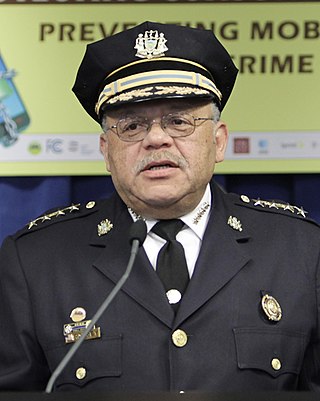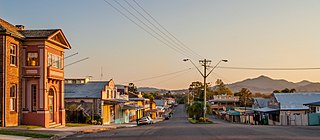Related Research Articles
The police procedural, police show, or police crime drama is a subgenre of procedural drama and detective fiction that emphasizes the investigative procedure of police officers, police detectives, or law enforcement agencies as the protagonists, as contrasted with other genres that focus on non-police investigators such as private investigators.

Sarah MacDiarmid was a 23-year-old Scottish-Australian woman who disappeared from Kananook railway station in Melbourne, Victoria, Australia on 11 July 1990. She is presumed murdered, although no trace of her body has ever been found.

Roger Caleb Rogerson was an Australian detective sergeant in the New South Wales Police Force and a convicted murderer. During his career, Rogerson received at least thirteen awards for bravery, outstanding policemanship and devotion to duty, before being implicated in two killings, bribery, assault and drug dealing, and then being dismissed from the force in 1986.

Homicide: A Year on the Killing Streets is a 1991 book written by Baltimore Sun reporter David Simon describing a year spent with detectives from the Baltimore Police Department Homicide Unit. The book received the 1992 Edgar Award in the Best Fact Crime category.

Charles H. Ramsey is the former Commissioner of the Philadelphia Police Department. Prior to assuming that post in January 2008, he had served as Chief of the Metropolitan Police Department of the District of Columbia (MPDC) from 1998 to early 2007. In January 2017, he became a regular CNN contributor.

Mr Cruel is the moniker for an unidentified Australian serial child rapist who attacked three girls in the northern and eastern suburbs of Melbourne, Victoria, in the late 1980s and early 1990s. He is also the prime suspect in the 1991 abduction and murder of a fourth girl, Karmein Chan. His moniker came from a headline in the Melbourne newspaper The Sun.

The Easey Street murders, often simplified to just Easey Street, refer to the knife murders of two women in Collingwood, Victoria, Australia, an inner suburb of Melbourne, in January 1977. Described as "Victoria’s most brutal crime", the case remains unsolved despite a A$1 million reward being posted in 2017.

Jane Elisa Thurgood-Dove was the victim of a murder in Niddrie, Victoria, Australia in 1997. On 6 November 1997, she was confronted in the driveway of her suburban Melbourne home and shot repeatedly as her three young children, aged 3, 5 and 10, cowered inside her car.
The Police Association Victoria (TPAV) is the union organisation representing about 18,000 members of the Victoria Police. The alliance is affiliated with the Police Federation of Australia, representing over 60,000 Australian Police Officers.

The Bowraville murders is the name given to three deaths that occurred over five months from September 1990 to February 1991 in Bowraville, New South Wales, Australia. All three victims were Aboriginal, and all disappeared after parties in Bowraville's Aboriginal community, in an area known as The Mission. A local labourer, who was regarded by police as the prime suspect, was charged with two of the murders but was acquitted following trials in 1994 and 2006. On 13 September 2018, the New South Wales Court of Criminal Appeal decided that the man could not be retried for the murders. On 22 March 2019, the High Court of Australia refused an application by the Attorney General of New South Wales to bring an appeal against that decision.
Kenneth Douglas Lay, is a former Australian police officer and Chief Commissioner of Victoria Police from 2011 to 2015. He was Lieutenant-Governor of Victoria from November 2017 to November 2021.
In 2004 the murders of Terence and Christine Hodson caused the Victorian government to establish the Office of Police Integrity to investigate probable Victoria Police involvement in the murders and to investigate the leaking of sensitive police information to the Melbourne underworld.
Gillian Meagher was a 29-year-old Irish woman living in Australia who was raped and murdered while walking home from a pub in Brunswick, an inner suburb of Melbourne, Victoria, in the early hours of 22 September 2012.
The murders of Karlie Pearce-Stevenson and Khandalyce Pearce were initially treated as unrelated. The skeletal remains of Pearce-Stevenson were found in Belanglo State Forest, New South Wales, Australia in 2010. Her daughter Khandalyce Pearce's remains were found near Wynarka, South Australia in July 2015. The two cases were not linked until positive identification was confirmed by DNA testing in October 2015. The mother and daughter were last seen by family in 2008 in Alice Springs, Northern Territory and reported missing in 2009; however, the report was withdrawn. It was discovered Pearce-Stevenson's mobile phone was used for years following her death to send false "proof of life" messages to family and friends. The mother and child's identities were exploited by third parties to commit social security and other types of identity fraud.

William Tyrrell is an Australian boy who disappeared at the age of three from Kendall, New South Wales, on 12 September 2014. He had been playing at his grandmother's house with his sister, and was wearing a Spider-Man suit at the time of his disappearance. For the first seven years of the investigation, Tyrrell was believed to have been abducted. On 12 September 2016, a reward of A$1 million was offered for the recovery of Tyrrell and did not require the arrest, charging or conviction of any person or persons.
Criminal activity in Victoria, Australia is combated by the Victoria Police and the Victorian court system, while statistics about crime are managed by the Crime Statistics Agency. Modern Australian states and cities, including Victoria, have some of the lowest crime rates recorded globally with Australia ranked the 13th safest nation and Melbourne ranked the 5th safest city globally. As of September 2018 the CBD of Melbourne had the highest rate of overall criminal incidents in the state (15,949.9), followed by Latrobe (12,896.1) and Yarra (11,119.2). Rural areas have comparatively high crime rates, with towns such as Mildura (9,222.0) and Greater Shepparton (9,111.8) having some of the highest crime rates in the state.

The Mount Isa Murders, also known as the Spear Creek Killings, took place 12 km (7.5 mi) from the small North Queensland town of Mount Isa at Spear Creek. While there have been a number of other murders, the term "Mount Isa Murders" here refers to the Spear Creek Killings. This triple murder took place in October 1978 and remained unsolved until an arrest was made in April 2019.
Marion Barter was an Australian missing person, teacher and mother-of-two, who disappeared on Sunday 22 June 1997 from Southport, Queensland. She was dropped off at a bus station in Surfers Paradise, Queensland to go to the airport for a planned, long-term vacation in England. She has not been seen since.

The Royal Commission into the Management of Police Informants - An inquiry into Victoria Police’s use of Nicola Gobbo as a human source, referred to in the press as Lawyer X Royal Commission, was a royal commission in Victoria, Australia set up to examine the actions of Nicola Gobbo and Victoria Police whilst Gobbo, also referred to as Informer 3838, Lawyer X (media), and EF (litigation), was working as a lawyer and acting as a registered informer. It was announced on 3 December 2018, in response to the High Court AB v CD; EF v CD judgement, and was established on 13 December 2018 under Hon Margaret McMurdo to examine the adequacy and effectiveness of the processes of Victoria Police for the recruitment, handling and management of human sources who are subject to legal obligations of confidentiality or privilege and the effect of using such sources on past cases.
References
- ↑ "Great Australian Homicide Detective Ron Iddles," [In Conversation with Richard Fiedler], Tuesday 23 August 2016 Conversations Retrieved 2 September 2016
- ↑ IN STUDIO: Ron Iddles opens up to Neil Mitchell about life in the homicide squad July 27, 2016 3AW Retrieved 2 September 2016
- ↑ Ford, Justine, "Book extract: Homicide detective Ron Iddles really has seen it all" July 31, 2016 news.com.au Retrieved 2 September 2016
- ↑ Victoria's Police Association boss Ron Iddles to step down, remembers cold cases as most significant October 14, 2016 ABC Online Retrieved 31 October 2016
- ↑ Premier of Victoria, Media Release, 20 April 2017 <Online: http://www.premier.vic.gov.au/an-independent-voice-for-community-safety/>
- ↑ "The Great Man," Police Journal, October 2015
- ↑ Ford, J., "Homicide cop Ron Iddles prepares for Victorian Police Association job," Sydney Morning Herald, 23 March 2014,
- ↑ ABC News, http://www.abc.net.au/local/stories/2016/08/23/4524861.htm
- ↑ "From Rochestser to the Homicide Squad," 'Bendigo Advertiser, 27 February 2017 Online: http://www.bendigoadvertiser.com.au/story/2170593/from-rochester-to-the-homicide-squad/
- ↑ Broadhurst, M., "Iddles to Talk about the Good CopEuroa Gazette, 18 January 2017,
- ↑ "Trace". www.abc.net.au. Retrieved 9 March 2020.
- ↑ Valentish, Jenny (24 August 2018). "'I started having nightmares': behind the scenes of Trace, the hit true-crime podcast". The Guardian. ISSN 0261-3077 . Retrieved 9 March 2020.
- ↑ Trace, Rachael Brown for; staff (30 November 2018). "Maria James murder case reopened by coroner after ABC's Trace podcast". ABC News. Retrieved 9 March 2020.
- ↑ "Former homicide detective Ron Iddles Reflects on His Police Career, Bendigo Advertiser, 27 February 2017,
- ↑ Ford, J., The Good Cop, Macmillan, 2016
- ↑ "Looking back at murders". Shepparton News. 30 January 2019. Retrieved 24 February 2021.
- ↑ Shepparton News,27 August 2016, https://www.pressreader.com/australia/shepparton-news/20160827/282046211521170
- ↑ ABC News, 14 October 2016
- ↑ ABC Radio, Conversations with Richard Fiedler,
- ↑ "Former Homicide Detective Ron Iddles Reflects on His Police Career," Bendigo Advertiser, <Online: http://www.bendigoadvertiser.com.au/story/4494073/ron-iddles-reflects-on-his-police-career>
- ↑ Cowie, R., "Former homicide detective Ron Iddles steps down as police union boss," The Standard, 15 October 2016,
- ↑ Gray, D., "Retired police officer Ron Iddles to be state's first Community Safety Trustee" The Age, 19 April 2017
- ↑ "Ron Iddles: Australia's Greatest Detective - #9". acast. Retrieved 27 February 2020.
- ↑ "A Life In Murder - Ron Iddles: The Good Cop". foxtel.com.au. 18 July 2019.
- ↑ "Ron Iddles: The Good Cop - Foxtel". Spotify. Retrieved 9 March 2020.
- ↑ Willix, Pierra (15 August 2021). "Ron Iddles retraces murder cases in new series" . The West Australian . Retrieved 17 January 2023.